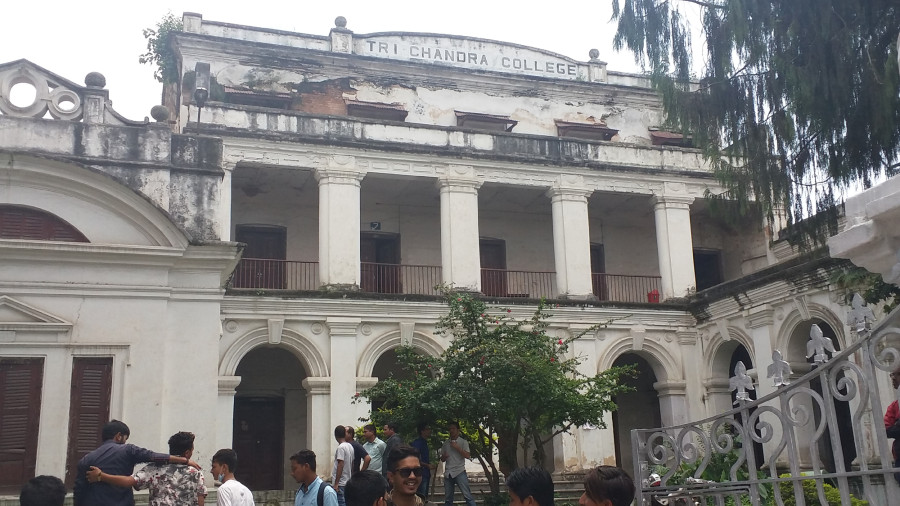Columns
Student unions fail to adhere to student-centric agendas
In terms of civic participation, those students who are not involved in any union are doing a better job.
Arjun Thapa
Last week, while I was walking in front of Nepal's oldest higher education provider, Trichandra College, I noticed the building of the Geography Department, still standing but gradually fading. We are talking about the infrastructure belonging to a revered public institution. There have been thousands of students who have graduated from this institution, paying the least amount of tuition fees. Some of the graduates are currently working in reputed organisations; few of them might have been renowned geographers or politicians—graduates of Trichandra have become ministers even—but the dilapidated building remains helpless in the heart of Kathmandu. It may not be wise to judge the quality of education provided at Trichandra by the exterior facade of its buildings, but the appearance of the infrastructure signifies some things are not going well within the institution. We can consider that the government-owned education institutions lack a large budget. But they have plentiful human resources if the administration wishes to mobilise them for a good cause.
There are numerous serious problems prevalent in public education which have been deteriorating the quality of education for a long time. The politicisation of management, professors and student governance are a significant cause for this. And such an issue has been deteriorating the quality of private schools and colleges as well.
Management is accountable, for better or worse, for the performance of any institution. In recent times, we have seen the positive transformation that slight change in management can have on institutions, as observed in a few of the community schools. There is no reason to believe that such changes would not occur in how the campuses and universities are run as well. The sad fact is that student unions have been influencing the management of public institutions. To fulfil the demand of particular interest groups, they padlock administration offices—and the administration is also used to such incidents happening with regularity.
In most cases, both management and student bodies are found to be besieged by the interest groups of different political parties. There is a general understanding that the educational institutions have been weakening due to politically motivated unionisation. The professors are also party to this trend.
It is undeniable that the political transformation that we have witnessed since the Rana regime owes a lot to the valuable contribution of the student-cum-political leader. Politically motivated students helped establish democracy in Nepal. In the early stages of political transformation, the students were the only medium to create awareness among the people and to sow the seeds of democracy across the country. To accomplish their goals, the leading student figures of that time —the late BP Koirala and GM Singh among others—introduced the concept of the student union with the Nepal Chatra Sangh in India. Later, that leadership came into power with the majority vote in the first democratically held elections, but failed to restore democracy due to a coup by King Mahendra. As a result, Nepal underwent another political turmoil—the Panchayat system. It was during this time that student unions were formally introduced in the campuses as students' representative welfare organisations meant to fight for the students' rights. The functioning, however, was deviated towards the movement for the restoration of democracy. With the help of student unions, political parties were able to establish a multiparty democracy by overthrowing the Panchayat system.
Through these political developments, the unions contributed very little to student welfare. Following the development of higher education institutions across Nepal, the student unions started mushrooming as the wings of different political parties. Unfortunately, instead of utilising the knowledge and skills of the youths to transform the nation, they have been mobilised by the major political parties in destructive activities, ranging from vandalising public property to abduction and extortion for material gains.
It is indeed surprising not to hear of any student union fighting against the deteriorating quality of education, the subsequent corruption cases within the university, haphazard affiliation decisions and the campuses becoming a breeding ground for the educated unemployed. It is distressing to note that the student unions didn't issue a public notice against corruption during the recent turmoil at Tribhuvan University. At present, the student unions are solely focused on power accumulation and making a ladder to reach in mainstream politics ignoring the future of thousands of other students. Subsequently, a majority of the people now believe that either student unions need to realign their priorities or that there should be alternate Student Welfare Clubs (SWC) and Alma Mater Societies (AMS).
In terms of civic participation, those students who are not involved in any political union are doing a better job compared to those that are members. We have been witnessing hundreds of students peacefully protesting for the right to clean air, youth rights, climate justice and for several social causes. Last time, school and college students together showed solidarity to Greta Thunberg's #Fridayforfuture, a climate justice movement at Maitighar mandala. And, in 2016, a large number of students were involved in #Maskmandu—a peaceful protest demanding clean air and implementation of Article 30 of our newly promulgated Constitution. Nevertheless, it is almost impossible to see the engagement of student unions in such cases.
It is high time to form and strengthen SWCs and AMSs in each institution for the betterment of the students to renew the academic environment in them. A country like ours, having an increasing problem of out-migration, needs to have an alumni network to build up the institutions and thereby support in development and retaining skilled youths.
***
What do you think?
Dear reader, we’d like to hear from you. We regularly publish letters to the editor on contemporary issues or direct responses to something the Post has recently published. Please send your letters to [email protected] with "Letter to the Editor" in the subject line. Please include your name, location, and a contact address so one of our editors can reach out to you.




 8.75°C Kathmandu
8.75°C Kathmandu















